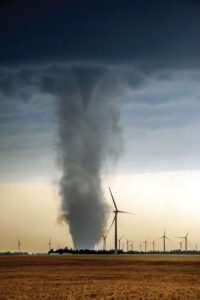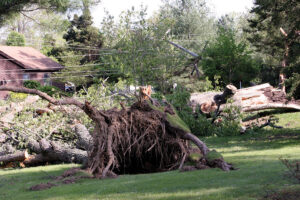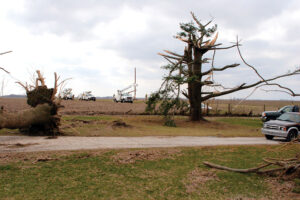
It’s human nature, we don’t tend to think we need insurance until the disaster hits. As homeowners we know we need insurance to cover a fire or flood. As a country we also have a disaster “insurance policy” we share called the Federal Emergency Management Agency (FEMA).
Duane Noland, President/CEO of the Association of Illinois Electric Cooperatives says, “When a town is blown away by a tornado, or an electric cooperative has its entire power grid destroyed by an ice storm, FEMA should be there to help rebuild. Unfortunately, this disaster safety net we all pay for is being denied to rural areas especially in states like Illinois with larger urban areas such as Chicago. The large population difference between large urban areas and less populated areas of a state means FEMA will likely deny a claim for rural areas because of its existing formula. That’s why I’m very thankful there is a bipartisan effort being led by our Illinois representatives and senators to correct this FEMA formula.”
In April, Illinois Congresswoman Cheri Bustos (IL-17) joined with fellow downstate Representatives Rodney Davis (IL-13), John Shimkus (IL-15), Mike Bost (IL-12) and Adam Kinzinger (IL-16) and Illinois Senators Dick Durbin and Mark Kirk in the introduction of the Fairness in Federal Disaster Declarations Act to reform FEMA’s disaster declaration process and bring fairness to small communities in larger states like Illinois.
“The communities across our region of Illinois should receive fair treatment when it comes to qualifying for federal disaster assistance,” said Congresswoman Bustos. “This bipartisan effort will help ensure downstate Illinois communities are competing on a level playing field with other communities across the country when it comes to qualifying for the FEMA support they need to recover from natural disasters.”
 “Changes to FEMA’s disaster declaration process can’t come soon enough for communities across Illinois, and I am glad members of the Illinois delegation have joined together in support of this legislation,” said Senator Dick Durbin. “We don’t know when the next severe weather event will strike, but we should be able to count on the federal government to provide assistance when it does. It’s time to fix the broken metrics that FEMA uses to determine disaster assistance and bring some fairness back into the system so that people in Illinois are not unfairly punished for living in a populous state.”
“Changes to FEMA’s disaster declaration process can’t come soon enough for communities across Illinois, and I am glad members of the Illinois delegation have joined together in support of this legislation,” said Senator Dick Durbin. “We don’t know when the next severe weather event will strike, but we should be able to count on the federal government to provide assistance when it does. It’s time to fix the broken metrics that FEMA uses to determine disaster assistance and bring some fairness back into the system so that people in Illinois are not unfairly punished for living in a populous state.”
“Communities like Washington, Illinois, that have been devastated by natural disasters should not be ineligible for aid just because FEMA’s methodology is outdated,” said Senator Mark Kirk. “Having seen firsthand the damage the 2013 tornadoes caused this community, I have continued to urge FEMA to reevaluate their methodology for determining aid, and will continue to work with my bipartisan colleagues to ensure that families are not stuck without help when it is most needed.”
 “Time and time again we’ve seen FEMA deny downstate communities from receiving federal assistance following storms,” said Congressman Rodney Davis. “The most recent examples being Gifford and Washington, but just a few years ago Harrisburg in Southern Illinois was denied as well. It simply isn’t right when a storm leaves behind damage in Missouri, Illinois and Kentucky and the only communities to be denied federal assistance are in Illinois. The current system puts downstate and rural communities at a strong disadvantage, and that has to change.”
“Time and time again we’ve seen FEMA deny downstate communities from receiving federal assistance following storms,” said Congressman Rodney Davis. “The most recent examples being Gifford and Washington, but just a few years ago Harrisburg in Southern Illinois was denied as well. It simply isn’t right when a storm leaves behind damage in Missouri, Illinois and Kentucky and the only communities to be denied federal assistance are in Illinois. The current system puts downstate and rural communities at a strong disadvantage, and that has to change.”
“Downstate Illinois is disadvantaged when disasters strike, due to our population upstate,” said Congressman John Shimkus. “This legislation helps to address that problem and would allow communities like Gifford and Brookport, who were hit by tornadoes two years ago, a chance to be eligible for FEMA Public Assistance. A million dollars to Chicago may not matter much, but it does to my constituents.”
“After a disaster strikes, the stress and uncertainty of those residents directly impacted weighs heavily on each person and worrying about not receiving Federal assistance just makes matters worse,” said Congressman Mike Bost. “Every Illinoisan and every community in our state deserves fair treatment in deciding Federal assistance instead of relying on arbitrary formulas that are beyond the control of disaster victims.”
“When a disaster hits a small town, it affects everybody because of the close ties of the community, yet we see these towns being penalized due to an unfair formula that favors bigger cities,” said Congressman Adam Kinzinger. “Our formula for distributing federal disaster resources should be based on where the need is greatest, not arbitrary population numbers, and this legislation does just that.”
 According to a report by the Congressional Research Service (CRS), FEMA already takes into account several factors when determining the need for Public and Individual Assistance. However, there is currently no standard to determine which factor is more important than another, which leads to a highly subjective and uncertain process that leaves states and communities in limbo for weeks as their application is considered.
According to a report by the Congressional Research Service (CRS), FEMA already takes into account several factors when determining the need for Public and Individual Assistance. However, there is currently no standard to determine which factor is more important than another, which leads to a highly subjective and uncertain process that leaves states and communities in limbo for weeks as their application is considered.
The Fairness in Federal Disaster Declarations Act of 2015 will provide more certainty and fairness to states and small communities impacted by disasters by giving FEMA a clearer, more substantive formula when evaluating disaster areas. This bill assigns a specific weight to each of the factors already used by FEMA, and adds other economic factors for the agency to consider when determining whether or not a disaster area should receive federal assistance.
“I know there is often a lot of talk about the bitter divide in Congress, but this is an example of a truly bipartisan effort to correct a fundamental unfairness,” says Noland. “All of us who live in downstate Illinois, and across rural America for that matter, should thank our leaders for coming together to try and make a much needed change in FEMA rules.”
For more information about the formula breakdown for Public Assistance specified in the legislation, and a description of each factor currently used by FEMA, go to icl.coop and click on Our Magazine/Issues and choose June 2015.








